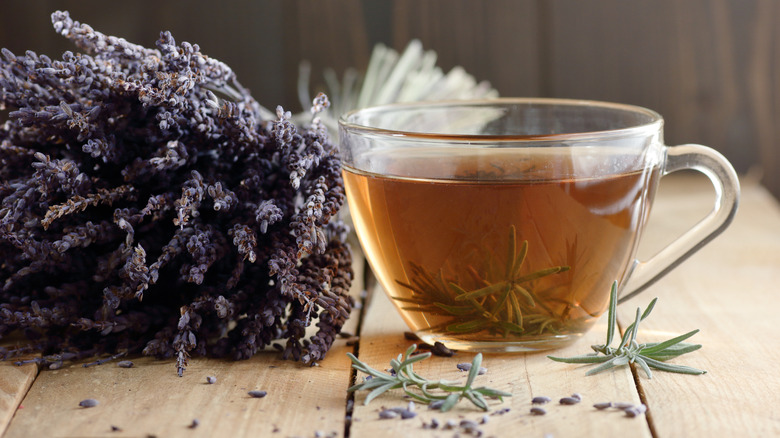Is It Bad To Drink Green Tea At Night?
What better way to wrap up your day than by settling into bed with a piping hot cup of tea? You can practically feel the stress melting away as the beverage warms you from the inside out. As delightfully relaxing as tea can be, however, some types of tea may be better for our quality of sleep than others.
Sourced from the Camellia sinensis plant, green tea is praised for its many purported health benefits such as relieving digestive discomfort, alleviating headaches, and potentially reducing one's risk of developing cardiovascular disease, per the National Center for Complementary and Integrative Health.
However, when it comes to lulling us to sleep, green tea may be the opposite of beneficial. While not as caffeinated as black tea or oolong tea, anywhere from 24 to 39 milligrams of caffeine can be found in an 8-ounce cup of green tea (via Medical News Today). While that's far less than what you'll find in an energy drink, those who are sensitive to caffeine may find that green tea keeps them awake well beyond their bedtime (via Healthline). Not only that, but caffeine acts as a diuretic. Therefore, drinking a cup or two of green tea before bed may have you running to the bathroom throughout the night.
Nighttime alternatives to green tea
On the flip side, green tea could also have a rather surprising nighttime benefit. A 2008 animal study found that chemicals in green tea may help fight off cognitive impairment symptoms associated with obstructive sleep apnea (per ScienceDaily). Researchers from the study administered drinking water infused with green tea polyphenols (GTP) to a group of male rats, while the control group of rats drank plain water. To mimic symptoms of obstructive sleep apnea, both groups experienced periodic oxygen depletion as they slept. Rats who received the water combined with GTP demonstrated greater memory and learning capabilities compared to the rats who were given regular drinking water.
At the end of the day, however, some experts feel that alternate types of tea may ultimately be better suited for sleep. "Chamomile contains apigenin, which can have a calming and sedative effect," registered dietitian Brittany Modell tells Well+Good. Modell goes on to say that lavender tea can also be a great substitute. Neither of these beverages contain caffeine.
However, if green tea is truly your first love, sports dietitian Kelly Jones suggests that those who are caffeine-sensitive try adjusting the timing of their green tea consumption (per Well+Good). "Decaffeinated green tea may be okay before bed, but I recommend abstaining from caffeine four to eight hours before bed, depending on individual tolerance," Jones tells Well+Good. She adds, "Disruptions in sleep patterns may lead to metabolic irregularities that counteract the benefits of the green tea polyphenols."


